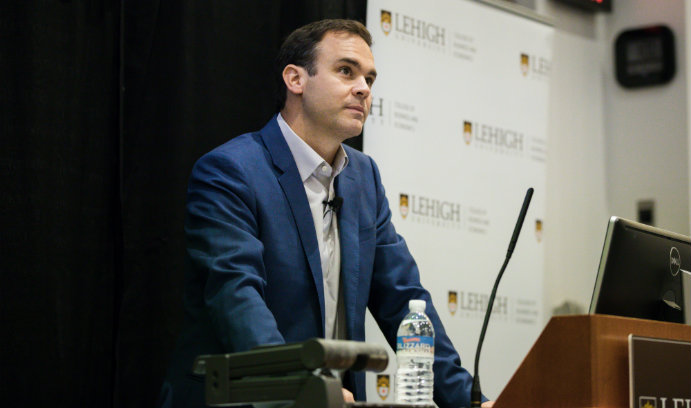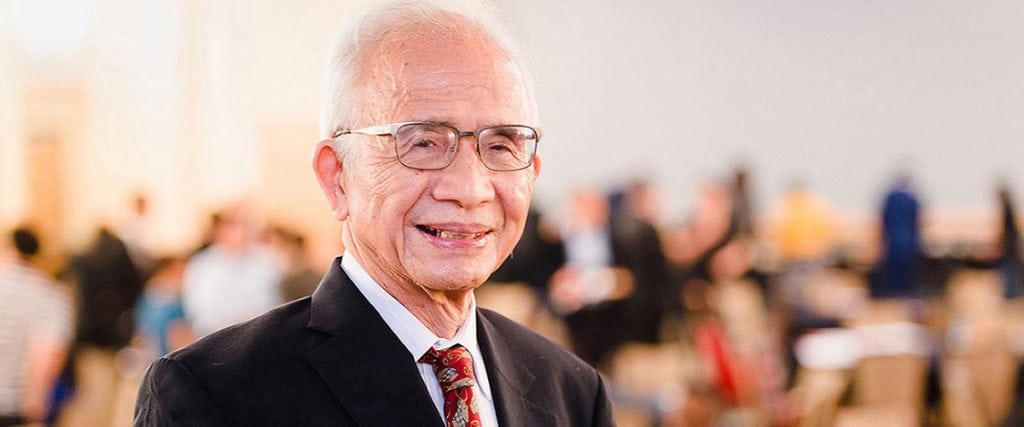Marketing Magic, The Business of TV, and More – New York News

Let’s explore some of the most interesting stories that have emerged from New York business schools this week.
Magic and the Modern Business World – Gabelli Connect
Gabelli School of Business Clinical Associate Professor Timothy Malefyt uses capital-M ‘Magic’ (think David Blaine, Siegfried & Roy, Penn & Teller) to explain how “magical practices can be found in contemporary capitalist societies.”
In his new book, Magical Capitalism: Enchantment, Spells, and Occult Practices in Contemporary Economies, Malefyt explains, “Magic offers a way to make a connection and effect change through willful beliefs and ritual practices.”
He elaborates:
“[In advertising] you don’t know if the customer will like this ad so similarly to how magicians rely upon magical rites, advertisers often use “formulas” to feel comfortable in their presentation to a client, such as habits surrounding the time they present or the way everyone is sitting at the table.”
You can read more about Malefy’s work here.
Binghamton University Student Approaches TV Production with Business Mindset – Binghamton SOM Blog
The Binghamton SOM Blog recently profiled business administration student Zach Homler, who has made significant early strides toward a promising career behind the scenes of film and television.
Following an internship on the Fusion and truTV variety talk show The Chris Gethard Show in which he “helped prepare celebrity guests such as Jason Sudeikis, Seth Meyers, Nick Kroll and Ellie Kemper,” he landed back-to-back PA (production assistant) gigs on Netflix and Amazon Prime shows.
Homler compares his experience to a case competition. “You have this project or this problem to solve, and you do some work, weigh your options, then present your recommendations to the decision makers.”
Homler hopes to pursue a career in either in entertainment law or talent management.
“This is me getting my foot in the door. I’m able to get that ground-up perspective of what goes into these productions, and I think putting in that work and understanding the day-to-day process is only going to help me on the business side of things. And so far, it’s been a lot of fun.”
You can read more from the recent interview here.
Fred Schaufeld Talks about Luck, Opportunity and Lehigh – Lehigh College of Business and Economics News
As part of its Distinguished Finance Speaker Series, the Lehigh College of Business and Economics recently hosted Fredrick D. Schaufeld (’81 ’15P ’17P), whose presentation Managing Luck: Lessons from Lehigh and Life When Not Everything Goes Quite as Planned contained many hard-won lessons from his career as Co-Founder and Managing Director of venture capital private equity firm SWaN & Legend Venture Partners.
Schaufeld offered three major takeaways for the audience:
- Failure does not equal death. “Wherever you are in your career, you’re building a portfolio of ideas, relationships, networking and skill sets. When you fail, you might go back a little, but you can build on that and keep going forward.”
- Your time is worth more than your money. “If you’re miserable, do it a different way or do something else.”
- Don’t wait for wisdom to find you. “You’re wealthy now, whether you realize it or not. I learned that at a relatively young age, with no money in my pocket.”
Schaufeld explains, “[SWaN & Legend] invest in special human beings who lead companies with social impact. Ethics mean a lot to us. We focus on companies people are passionate about,” such as KIND Healthy Snacks, Gwynnie Bee, Airbnb, Sugar23, the Washington Nationals, Washington Capitals, and the Professional Fighters League.
You can read more about the recent event here.
Financing Strategies For “Nice” People, and More – New York News

Let’s explore some of the most interesting stories that have emerged from New York business schools this week.
When It Comes To Their Finances, Nice Guys Fall Short – Columbia Business School News
According to new research co-authored by Columbia Business School‘s Sandra Matz, “people who describe themselves as ‘agreeable’ are strongly connected to a bleak financial future—including lower savings, higher debt, and a higher likelihood of becoming financially insolvent.”
Matz elaborates, “This research proves that being nice may win friends but it can cost a lot of money. This is especially true for those who start off with less money, as they have no financial safety net to compensate for their personal habits. Unfortunately, having a nice and warm personality—in the arena of business and finances—can often have real financial costs.”
According to the article, “Agreeable individuals perceive money to be less important than their more disagreeable counterparts, and consequently have, on average, worse financial health—which is measured by savings, debt, and default behaviors.”
“Nice Guys Finish Last: When and Why Agreeableness Is Associated With Economic Hardship” was published in the Journal of Personality and Social Psychology.
You can read more about Matz’s research here.
Opportunities Abound in Distressed Debt Investing – Gabelli Connect
The Fordham University Gabelli School of Business recently hosted a talk at its McNally Amphitheatre on the subject of “distressed debt investing,” a multi-trillion dollar industry in which “investors hunt for opportunities where they can purchase debt [with the hope] that the gambit will pay off eventually.”
Attendees were privy to first-hand accounts of distressed debt investments and legal advice from a variety of experts. Baupost Group partner Fred Fogel highlights the “importance of both curiosity and perseverance.” Paul Weiss Bankruptcy and Corporate Reorganization Co-Chair Alan Kornberg “encouraged those just starting out to get a feel for the process by sitting in on bankruptcy hearings.”
Former Wachtell Lipton Bankruptcy Department Head Chaim Fortgang emphasizes the creation and maintenance of “good working relationships.”
You can read more about the talk here.
Look to Entrepreneurs For What’s Next in Healthcare – Johnson Business Feed
The Johnson Business Feed interviewed visiting faculty member Elspeth Murray about the increasing demand for innovation in the healthcare industry, from the use of smartphones to the expansion of ambulatory care.
“Consumer behavior has changed, and that will begin to push on the healthcare system. At a certain point, healthcare practitioners are either going to lose patients or be forced to adopt new ways of treating and accommodating patients.”
She advises students returning to school to focus beyond their specialty and remain “open to taking risks and re-framing your view of the industry, and to be aware of what is happening outside of your bailiwick. Take a good look around at what’s happening and go for it.”
Murray’s 2002 book, Fast Forward: Organizational Change in 100 Days, which she co-authored with Peter R. Richardson, explores how “entrepreneurial thinking gives you the creative ideas and the juice and design thinking helps you see the problems to be solved in the right way.”
Check out the rest of the Murray interview here.
Information System Leaders, and More – New York News

Let’s explore some of the most interesting stories that have emerged from New York business schools this week.
Teaching Creativity, Strategy to Tomorrow’s Information Systems Leaders – Stevens Institute of Technology School of Business Blog
The Stevens Institute of Technology SOB spotlighted assistant professor of Information Systems Dr. Aron Lindberg, whose Digital Innovation course is a cornerstone of the master’s program in Information Systems.
Dr. Lindberg writes, “Digital products and processes are central to what businesses do today. And information systems professionals need to participate in the process of creating those products and services, and continuously pushing the envelope in search of innovation.”
He adds, “With all the data available today, you need the scientific method to ensure you’re doing your analysis in ways that are reliable and valid. Otherwise, you are not going to make good business decisions.”
Information Systems Master’s Program Director Dr. Paul Rohmeyer lauded Dr. Lindberg’s course, which “blends technical, management, strategy and entrepreneurship components, and presents them in an environment much like where they’ll work once they graduate.”
You can read the full article here.
NYU Stern Congratulates Paul Romer on Winning the 2018 Nobel Prize in Economics – NYU Stern
NYU Stern’s Paul Romer was recently awarded the 2018 Nobel Prize in Economics “for integrating technological innovations into long-run macroeconomic analysis.”
Romer has conducted “applied research on the many ways that policymakers in the developing world can use the growth of cities to create economic opportunity and pursue social reform” as part of the NYU Stern Urbanization Project, which he also founded.
Romer also directs the Marron Institute of Urban Management, which “deepens the fundamental understanding of cities by working with civic innovators to improve urban management.”
You can read the full release from NYU here.
Talking with … Albert Greco – Gabelli Connect
Gabelli School of Business‘ “Talking with …” feature recently spotlighted professor of marketing Albert Greco who is currently researching a business history book about the post-1980 U.S. trade book business and has a business history book proposal under review about the marketing and financing of World War II in the U.S.
Greco discussed what interests him most about teaching consumer behavior, which he has analyzed in some shape or form since 1985.
“Consumer behavior looks at great questions and issues related to who, what, when, where, how, and why consumers decide to buy, or not buy, products and services. This means analyzing issues related to age, gender, style, prestige, the channels of distribution, etc.”
Greco also talked about issues related to university presses, which he described as “critical to the intellectual life of universities and academics, but many of them are small to medium-sized undercapitalized presses, and they need to address costly back-office operations and scale issues.”
You can read more from the interview here.
Cornell Johnson Announces New Dean, and More – New York News

Let’s explore some of the most interesting stories that have emerged from New York business schools this week.
Kevin Hallock Named Dean of SC Johnson College of Business – Cornell Chronicle
The SC Johnson Graduate School of Management at Cornell University recently announced noted economist Kevin F. Hallock as its new Dean, effective December 15 and expected to run through June 30, 2024.
Provost Michael Kotlikoff explained the unique qualifications of Professor Hallock, an “expert on executive compensation, compensation design and labor markets.”
“As an accomplished economist, scholar and administrator, Kevin provides the Cornell SC Johnson College of Business with the leadership to maximize its enormous potential. His thorough familiarity with Cornell’s administrative workings is a significant asset, and the college will be well served by his deep understanding of business administration theory and practice.”
Hallock reportedly told the Cornell Chronicle that he is “grateful and excited to start this new chapter at Cornell.”
“The Cornell SC Johnson College of Business, in its infancy, faces challenges, like many new organizations, and those challenges are part of what attracted me to this role. But there is also enormous opportunity, outstanding strength and unique advantages in the college and its three schools. I am excited to work with its talented staff, students, faculty and alumni, and I am exceptionally optimistic about the future of the college.”
You can read more from the Cornell Chronicle article here.
College of Business and Economics Donates Barron’s Subscription to BASD – Lehigh College of Business and Economics News
The Lehigh College of Business and Economics recently donated a 12-month subscription to Barron’s to the Bethlehem Area School District (BASD), which Dean Georgette Chapman Phillips explains is an effort to provide “experiential learning opportunities “ to BASD students and faculty.
According to the article, Barron’s “covers global financial information, market developments, and includes a weekly summary of market activity.”
BASD Assistant Superintendent for Education and Chief Academic Officer Jack Silva explains, “The subscription will be used by students in our government and economics class. It’s a valuable resource that they can access 24/7 and supports our existing curriculum.”

Dean Phillips writes, “We are partnering with our community by sharing what we do best—business education.”
You can find out more about the donation and the business school here.
Finding Narratives in Numbers in Financial Reporting – Stevens Institute of Technology School of Business News
The Stevens Institute of Technology School of Business recently profiled Associate Professor of Accounting Dr. Elaine Henry, who’s work focuses on financial reporting as communication and recently coauthored a new Review of Accounting Studies paper on “flexibility in cash-flow classifications under the International Financial Reporting Standards.”
In an interview with the Stevens Institute of Technology School of Business News, Dr. Henry explains how they are continually inspired by the challenge that companies face to “tell their stories better and describe their economic reality more clearly.”
When it comes to financial reporting, there are stark differences between domestic and international guidelines that determine “how the underlying economic reality is portrayed.”
For instance, “under U.S. GAAP, companies must categorize interest paid, interest received and dividends received as operating cash flow, but IFRS gives companies the freedom to classify these items under operating, financing or investing cash flow. If, for example, an IFRS company chooses to classify its interest paid as a financing activity rather than an operating activity, that choice will result in the company showing a larger amount of operating cash flow—an important metric for financial analysis and valuation.”
You can read the rest of the Stevens interview with Dr. Elaine Henry here.
Cornell Introduces Grade Non-Disclosure – New York News

Let’s explore some of the most interesting stories that have emerged from New York business schools this week.
Johnson Students Vote to Enact Grade Non-Disclosure – Johnson Business Feed
After a year-long study initiated by Johnson’s Student Council to “evaluate the alignment of academics and recruiting,” Cornell Johnson students have “voted to enact a policy of grade non-disclosure” in which Two-Year, One-Year, and Johnson Cornell Tech MBA students need not “disclose their grades to recruiters until after a full-time, post-graduation job offer has been extended.”
Associate Dean for MBA Programs Vishal Gaur writes “We hope that grade non-disclosure will encourage students to take more academic risks and think holistically about their education, personal development, leadership, and the impact they want to have in the future.”
Victoria Wilmarth (MBA ’18), who is now Brigham and Women’s Hospital’s Deland Fellow in Hospital Administration believes “the vote will strengthen the school’s collaborative community.”
“This vote helps bring Johnson’s academic experiences into alignment with the school’s values. I think this will deepen students’ commitment to collaborative learning and support academic risk taking for professional and personal development.”
You can read the entire Johnson Business Feed article here.
Five New Faculty Bring Mix of Research Insight, Corporate Experience to Business School – Stevens Institute of Technology School of Business News
For the 2018-19 school year, the Stevens Institute of Technology School of Business welcomed five new professors, all of whom are well equipped to help students “think critically about technology’s role in solving business problems.”
- Assistant Professor Apostolos Filippas: “Research interests include business analytics, natural language processing, data science, online platforms and market design.”
- Assistant Professor Pranav Garg: “Studies human capital, organizational design and learning, and strategy.”
- Associate Professor Anand Goel: Formerly a Director with Navigant Consulting whose “corporate experience is enhanced by research work that has been featured in many top journals, including the Journal of Financial Economics, Review of Financial Studies, and Journal of Finance.”
- Assistant Professor Majeed Simaan: Research interests include “banking and risk management, financial networks and interconnectedness, and portfolio theory and asset allocation.”
- Assistant Professor Jordan Suchow: Formerly a “research scientist with the Berkeley Artificial Intelligence Research Lab at the University of California–Berkeley.”
You can find out more about the new hires here.
New York Times‘ David Gelles: ‘When CEOs Speak Out, the World Listens’ – Lehigh College of Business Blog
New York Times business reporter David Gelles used his keynote speech at the recent Lehigh University College of Business and Economics 2018 Impact Symposium to posit “companies can no longer afford to sit on the sidelines when it comes to the hot button issues of the day.”
“On topics ranging from climate change to health care, gun laws to birth control, the biggest brands in the country are being forced to take a stand. It’s hard to state what an abrupt change this is,” he explains.

Gelles at the recent Lehigh University College of Business and Economics 2018 Impact Symposium / Photo via Christa Neu
He adds, “Until recently, companies avoided controversy at all costs. But these days, they are confronting it head on, sometimes even embracing it when it arrives unexpectedly, and in rare instances, seeking it out.”
Gelles points to Salesforce founder and CEO Marc Benioff’s threat to relocate its Indiana office in response to a 2015 law that would have “made it easier for religious conservatives to refuse service to gay people.”
Gelles explains, “Being a chief executive no longer means just running a profit and loss statement. It means being prepared to articulate your values—and your company’s values—when you least expect it. When CEOs speak out, the world listens. Sometimes, policies even change.”
You can read more about Gelles’ speech at Lehigh here.
3D Printing Research, Success Without Passion, and More – New York News

Let’s explore some of the most interesting stories that have emerged from New York business schools this week.
Award-Winning Paper Explores How Designers Innovate in 3D Printing Communities – Stevens Institute of Technology SOB News
In a new paper from Gaurav Sabnis, Stevens Institute of Technology School of Business Assistant Professor of Marketing, Associate Dean of Research Dr. Jeffrey Nickerson, and the University of Navarra’s Dr. Harris Kyriakou “examines knowledge reuse in 3D printing communities [where] makers often iterate on designs created by other users to create refined products.”
According to the Stevens Institute of Technology SOB News article, “the professors looked at frequently reused designs and found a few clear signals in what helps designs get shared—from a designer’s level of experience, to the amount of information she included about her designs.”
The trio’s research is among the first to properly survey 3D printing communities and it could have only happened in the interdisciplinary incubator that is Stevens. Dr. Sabnis writes, “Stevens has a great culture that leads to more interdisciplinary research. I’m excited to do the kinds of research that creates real-world solutions for businesses in the digital age.”
You can read more about the 3D printing research from Stevens here.
Reviving Grit: Columbia Business School Study Finds That In Pursuit of Success, Dedication Falls Short Without Passion – Columbia Business School News
In a new PNAS study, Columbia Business School and Frankfurt School of Finance & Management researchers found that grit “without the clear sense of direction that passion provides does not propel people forward.”
Columbia Professor and co-author Adam Galinsky writes, “We were not surprised to find that dogged dedication to an objective – without a true passion for the goal – is mere drudgery.”
“But until now, research on grit failed to factor in the propulsive force that animated grit’s perseverance. By properly incorporating passion into the grit equation, we now have evidence that people who are passionate for their goal and persevere towards it will reach higher heights.”
You can find Why Grit Requires Perseverance and Passion to Positively Predict Performance here, and discover more fro the Columbia Business School News article here.
Where Professors Share Knowledge on Issues in Finance, Economics and Accounting – Rutgers Business School News
The Livingston Student Center recently hosted the annual Conference on Pacific Basin Finance, Economics, Accounting, and Management, which was founded by Rutgers Business School Distinguished Professor of Finance and Economics Cheng-Few Lee at the business school in 1992.

Rutgers Business School Distinguished Professor of Finance and Economics Cheng-Few Lee / Photo via business.rutgers.edu
The conference assembles “finance professors from around the world” to absorb “research on a variety of issues, from financial applications of parallel processing to the ethics of cryptocurrency.”
According to the Rutgers Business School News article, “Many of the conference speakers were Professor Lee’s former colleagues or students, including professor Yong Shi, who is one of 13 advisors to China’s premier, [and] delivered a keynote address on big Data Mining and Knowledge Management.”
You can read more about the event here.
